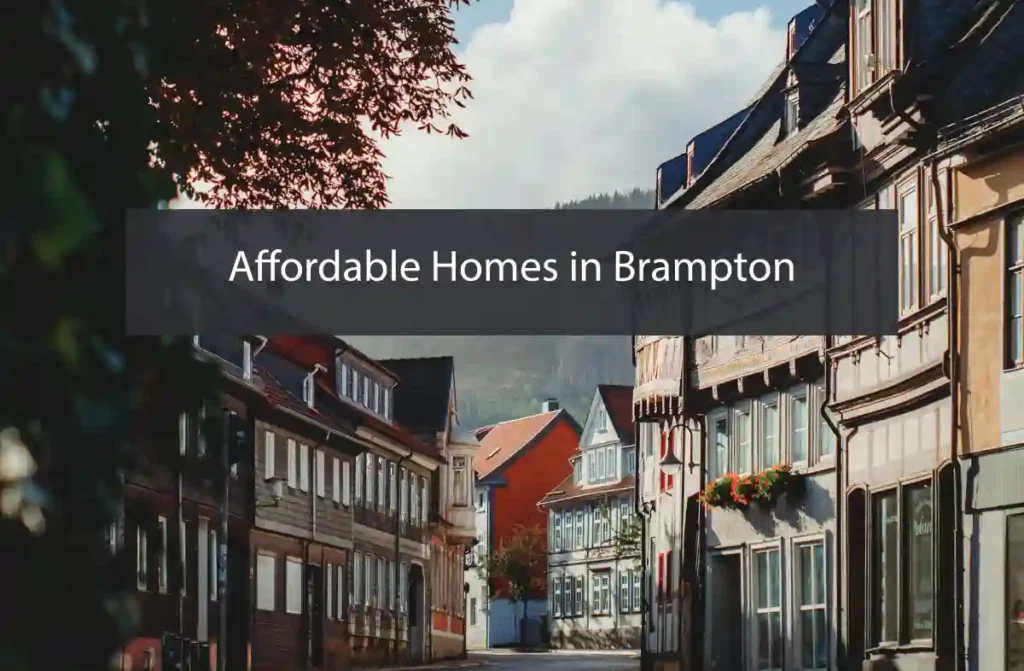Wondering about Brampton property tax? Learn how it’s calculated, payment options, rebate programs, and tips for managing increases. Get informed to handle your property tax with ease.
Table of Contents
For anybody with a property in Brampton, Ontario, it is vital to comprehendBrampton property tax. This is an overview of property tax, an important consideration for homeowners on the calculation of tax, times for tax payment or how to better manage your tax. You will find this guide quite useful in demystifying Brampton property tax as you peruse through it.
What is Property Tax?
Real estate tax is a direct charge on properties made by the municipal authority of the city where the property exists. The amount of money generated from property taxes is utilised on supplying local services in education, transport infrastructure, law enforcement and other social services. Brampton property tax is charged according to the assessed value of your property.
How is Property Tax Calculated in Brampton?
The Brampton property tax is calculated using the following formula:
Property Tax = Assessed Value x Tax Rate
1. Assessed Value:
They are the Municipal Property Assessment Corporation of Ontario with the duty of valuing all properties in the province. MPAC employs several factors to set your property’s assessed value; some of them are its location, size, age, and condition among others. This one is revised and updated every four years based on the assessed value.
2. Tax Rate:
The tax rate is determined by the City of Brampton and is expressed as a percentage. The tax rate consists of three components:
- Municipal Tax Rate: Set by the City of Brampton to fund local services.
- Education Tax Rate: Set by the provincial government to fund education.
- Region of Peel Tax Rate: Set by the Region of Peel to fund regional services.
Understanding the Tax Rate
The arithmetic of Brampton property tax makes the tax rate of significant importance whenever you are calculating your property tax bill. The rate, it should be noted, can fluctuate depending on the class under which an individual falls, namely residential, commercial, industrial or farming class. Usually, the tax rate assigned to the residential properties is less than for the commercial or industrial ones.
Here is an example to illustrate how property tax is calculated:
- Assessed Value: $500,000
- Municipal Tax Rate: 0.45%
- Education Tax Rate: 0.16%
- Region of Peel Tax Rate: 0.25%
Total Tax Rate = 0.45% + 0.16% + 0.25% = 0.86%
Property Tax = $500,000 x 0.86% = $4,300
Property Tax Due Dates
Brampton property tax bills are issued bi-annually, just as it is in other regions, and each bill comes with a six-month period. The due dates are normally around March and September. Property tax should be paid on time to avoid charges of interest, which will be added on to the principal amount of tax.
Payment Options
The City of Brampton property tax offers several convenient options for paying your property tax:
- Pre-Authorized Payment Plan (PAP):
Sign up for the Pre – Authorized Payment Plan wherein your Brampton property tax is directly debited from your bank account. You can choose from three plans: To be paid on monthly installments, it can be 10 monthly payments, 12 monthly payments, or four installments. - Online Banking:
Use the online banking services provided by the bank through which you wish to pay your property tax. Make the City of Brampton a payee and put in your 17-digit roll number as your check’s account number. - In-Person:
You can pay your property tax in cash, cheque, or through debit card next at any of the Brampton Service Centre. - Mail:
Brampton city uses a cheque or money order in transacting its account with the residents. Always write your roll number on the cheque and should send the cheque quite some time prior to the expected date. - Telephone Banking:
Take advantage of your Bank’s telephone banking to pay your property tax. Set up the City of Brampton property tax as a payee according to the instructions on the Money Transfer Service activated page.
Managing Property Tax Increases
Property tax rates can change annually based on the city’s budget and funding needs. Here are some tips to manage potential increases in your property tax:

- Stay Informed:
Pay attention to any deliberations and/or decision-making processes with regards to the budget of the City of Brampton. Withholding tax is one of those topics that it is easy to be surprised when a tax rate is changed if one does not understand how the rate is arrived at. - Budgeting:
Budget for property taxes every year in your house. There is generally less pressure in having to part with large chunks of money since a figured amount has been saved monthly. - Apply for Rebates and Relief Programs:
The rebate and relief programs Canadian homeowners who reside in the City of Brampton property tax are as follows. These are the programs that can likely lower the property tax amounts that you have to pay.
Property Tax Rebates and Relief Programs
- Low-Income Seniors and Persons with Disabilities Tax Rebate:
In case you are a low-income earner, senior citizen or a person with disabilities, there is likelihood of enjoying a tax rebate. Generally, when it comes to specific programs, there is always an age limit, a certain income that you must meet or the property type you own. - Charity Rebate Program:
Organizations that are registered charities, which has acquired or rented a Brampton property tax at some level could receive property tax rebate. It suggested that the rebate is aimed to minimize charitable organization’s property tax expense to enable them to continue providing charitable services. - Heritage Property Tax Rebate:
Preservation of heritage structures may be facilitated by a tax credit where by owners of structures identified as heritage property receive a rebate to undertake repair works on the structures. - Vacancy Rebate Program:
Retail or industrial proprietors with empty premises might well be eligible for a property tax refund. Financial assistance is targeted at property owners who may have vacant shops or industrial zones that are hard to lease or rent out.
Disputing Your Property Assessment
If you believe that your property’s assessed value is incorrect, you have the right to file a request for reconsideration with MPAC. Here are the steps to dispute your property assessment:
- Review Your Assessment Notice:
Read the assessment notice that you get from MPAC and be sure to go through it legally. Check that all information about the property is correct. - Contact MPAC:
Indeed, if one is able to identify any inconsistency, or if the property is deemed overvalued in the organization’s assessment, then an individual is encouraged to visit MPAC and report the same. At other times it can be solved just by a word or two being said. - File a Request for Reconsideration:
In case you are not content with MPAC’s answer you can submit a formal Request for Reconsideration (RfR). This process requires the completion of a form together with materials that one wants to support the claim that the value is wrong.
Impact of Property Tax on Homeowners
Property tax is a significant expense for homeowners and can impact your overall financial planning. Here are some ways property tax affects homeowners:

- Monthly Budget:
Monthly payments of property taxes consumes a good portion of a household’s earnings. Therefore, appropriate planning is useful in preparation for the due time where one will be in a position to pay his or her taxes. - Home Affordability:
When purchasing a home property tax is therefore greatly considered from the standpoint of the areas affordability. Higher house rates may make the cost of owning a house to become higher. - Property Value:
Property taxes depend on the assessed value of the property in question; the higher the value, the more taxes you’ll have to pay. Knowledge of how your asset is assessed and appraised could assist you in containing the amount of taxes to be paid.
Tips for New Homeowners
If you are a new homeowner in Brampton, here are some tips to help you navigate Brampton property tax:
- Understand Your Tax Bill:
Before appealing, understand your property tax bill and these are the assessed value and the tax rate. Understanding how your tax is computed is also advantageous due to better financial plan. - Keep Records:
It is advisable to keep records of all the payments of your Brampton property tax. It can be rather helpful if you wish to appeal against your business’s tax schedule or apply for tax reduction. - Plan for Increases:
Re-assessments and changes in the tax rates of a property make the property taxes to rise from time to time. This means you should always have a safety net where you include such aspects in your budget in case they are to rise.
Conclusion
It is vital to have proper knowledge about Brampton property tax so as to handle finance related to property efficiently. Thus, by understanding how the property tax is computed, when it is paid and the available options to pay it as well as the options for relief, one can easily plan on their budget without the shock. However, if you have a concern with the property assessment contact MPAC, and see how you can appeal the assessment. Thus, you can safely deal with the perils of the Brampton property tax.
People Also Reading: Best Realtor in Brampton





